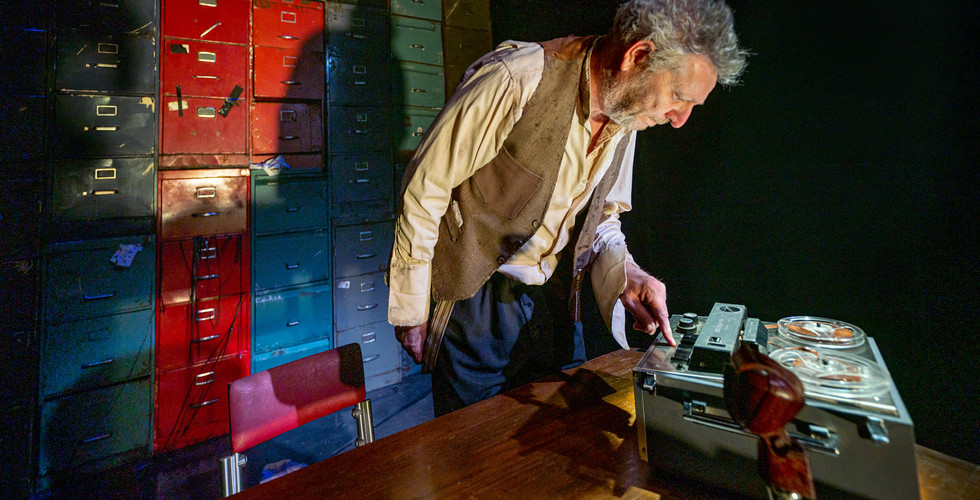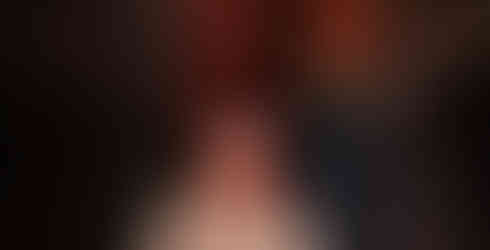Review: Krapps Last Tape Review at the Old Fitz
- Nov 30, 2019
- 3 min read
By Helena Parker
Krapps Last Tape has all the landmarks of a standard Beckett play; a squalid setting, a disheveled central character and an undeniable feeling of decay. Indeed, in true Beckett style, the play wryly opens with the sound of a toilet flush. The play revolves around a man named Krapp, who, on his 69th birthday is listening back to self tapes he made of himself at 39. The ageing man oscillates between scorn at his younger self, envy, confusion and deep sadness at all that he has lost in his life and what he could have had.
Gale Edwards masterfully handles the piece, without ever allowing the production to feel lingering or dull, as some Samuel Beckett plays can. This is due partially to the short run time of the production, yet also the humanity at the play’s heart. How often have we been regretful at the choices we have made in our lives or, if we are young, fearful of what may lie ahead of us, fearful of the way our lives may turn out and what mistakes we may inevitably make.
The production design of this piece is immensely strong, and commendation should be made to designer Brian Thomson and costume designer Olivia Rowlands. The spirit of decay is gloriously captured in stacks upon stacks of rotting filing cabinets as well of endless scraps of paper, piles of old tape film and a rickety table held together with a filing cabinet and duck-tape. The set and prop design captures the wretchedness of old age and Krapp’s yearning for all that he has lost: love, virility and youth. It is unusual to find such an elaborate set in such a small, often low-budget space as the Old Fitz Theatre, but it is a welcome sight and the design illustrates the desperation of the central character.
Edwards’ production does not stray too far from common iterations of Beckett plays visually, in fact, it is a very traditional production in many ways, most probably due to the playwrights highly prescriptive writing style. Jonathan Biggins as Krapp was costumed very well by Rowlands in the trademark ‘tramp’ outfit of stained clothes and baggy pants held up with a tight belt. This Krapp is worn out, worn down and reaching the end of his life. Lighting by Lucy Hughes also added to this feeling of squalor and staleness, with a warm bulb hanging above Krapp’s table, casting shadows over his face, as well as occasional dashes of purple lighting which appear as Krapp repeatedly exits the stage to drink alcohol.
Jonathan Biggins is excellent in his portrayal of Krapp, masterfully switching between traditional Beckett clowning and true pathos as the ageing man. Biggins is clearly a comic actor and delights in banana peel sequences and the eternal grumblings of the cantankerous Krapp. The audience especially responded very well to his frequent gags and comic performance, which were indeed very assured, although perhaps they lingered a little too long. Biggins was especially moving in the moments Krapp was listening, over and over again, to a recount of an intimate scene with his former lover.
Krapps Last Tape is undeniably a very solid production, and one of the most confident I have seen at the venue, yet the play is very brief, less than an hour. Part of me wanted the play to strike harder emotionally than it did. I wanted to mourn with Krapp and all he had lost in his life. But the production remains subtle and aloof, we never find out much about Krapp and he has few actual lines in the production (apart from those recorded at a younger age). Beckett prevents us from getting too close to the character and he remains mysterious.
Krapps Last Tape is a highly proficient production and definitely worth a look. This is a great introduction to the works of Samuel Beckett, as it is humorous and brief. But it is this brevity that keeps us, as an audience, at bay, and I only wished we could get a closer look at the eponymous Krapp.
Image Credit: John Marmaras
All opinions and thoughts expressed within reviews on Theatre Travels are those of the writer and not of the company at large.
















